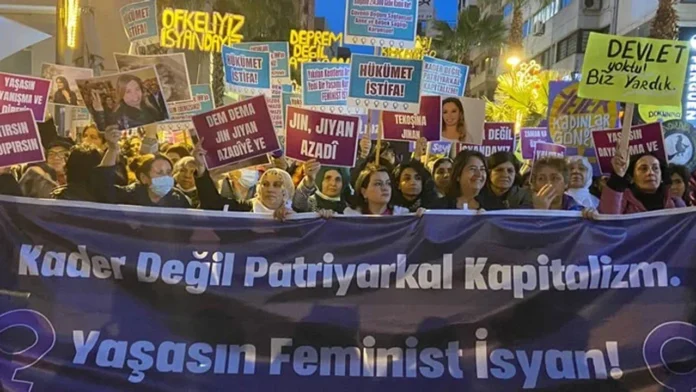Women’s rights organizations in Turkey said they would take to the streets on March 8,, International Women’s Day, in protest of increasing gender inequity in the country, the BirGün daily reported.
Speaking to the media, women’s rights activists said that gender equity had declined under the rule of the Justice and Development Party (AKP), which has been in power since 2002.
The biggest blow came when Turkish President Recep Tayyip Erdoğan issued a decree on March 20, 2021 that pulled the country out of the Council of Europe Convention on Preventing and Combating Violence against Women and Domestic Violence, also known as the Istanbul Convention.
The convention is an international accord that requires governments to adopt legislation prosecuting perpetrators of domestic violence and similar abuse as well as marital rape and female genital mutilation.
Erdoğan claimed at the time that the treaty had been “hijacked by a group of people attempting to normalize homosexuality” which he said was “incompatible” with Turkey’s “social and family values.”
Since Turkey’s withdrawal from the treaty, Turkish authorities have been pressuring women’s rights organizations for their activist work. Despite the pressure, the organizations have said they will continue monitoring violence and femicide because femicides and violence against women are chronic problems in Turkey, where women are killed, raped or beaten almost every day.
Many critics say the main reason behind the situation is the policies of the AKP government, which protects violent and abusive men by granting them impunity.
Turkish courts have repeatedly attracted criticism due to their tendency to hand down lenient sentences to offenders, claiming that the crime was “motivated by passion” or by interpreting victims’ silence as consent.
Since Turkey withdrew from the convention, hundreds of women have been victims of femicide.
Top government officials have been deliberating the repeal of Law No. 6284 for the prevention of violence against women. However, women’s rights activists strongly oppose repealing this law, arguing that after withdrawing from the Istanbul Convention, it remains the only safeguard for women.
The Izmir Left Feminist Movement stated that AKP policies aim to confine women to the home and make them dependent on their families and husbands.
“By declaring 2024 the Year of the Family, the government is reinforcing traditional domestic roles rather than addressing the real challenges women face at home and in the workplace,” the organization said.
Women also face systemic challenges in the labor force such as the wage gap, a lack of job security and the absence of childcare for working mothers, issues that are not on the government agenda.
The feminist movement also said that “working conditions are still terrible for women, and many women are condemned to poverty because they cannot find well-paying, permanent positions. However, there is a lack of political will to address these problems.”
Earlier this week, the Confederation of Revolutionary Workers Unions (DISK) called on women across Turkey to strike on March 8 and take part in nationwide demonstrations.
The We Will Stop Femicide Platform (KCDP) called on their followers to join them in the march on Saturday.
In a letter to the Istanbul Governor’s Office, Amnesty International urged authorities to respect and protect all participants in International Women’s Day demonstrations.
“For years, demonstrations have been obstructed by official and unofficial bans. Authorities must prevent a repeat of past police violence and arbitrary detentions and refrain from imposing unlawful restrictions on Women’s Day protests. The right to peaceful protest does not require government approval, as outlined in Turkey’s Constitution. States have a duty to protect protesters and facilitate peaceful demonstrations. Amnesty International urges authorities to uphold these obligations and ensure the Feminist March and other Women’s Day protests, especially in Istanbul and other cities.”















